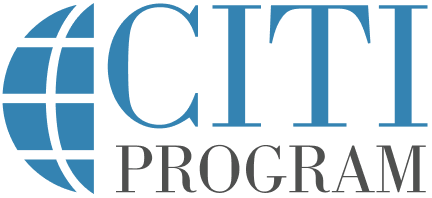The Trusted Standard in Research, Ethics, Compliance, and Safety Training
The Collaborative Institutional Training Initiative (CITI Program) is dedicated to serving the training needs of colleges and universities, healthcare institutions, technology and research organizations, and governmental agencies, as they foster integrity and professional advancement of their learners.



Explore Our Featured Courses
Provides essential training on why privacy awareness and compliance matter.

The course explores OPSEC in academia, training faculty, staff, and students to identify and mitigate risks to sensitive research data while upholding open science principles.

Provides learners with an understanding of the principles of inventory management.

This series provides a comprehensive overview of cybersecurity in healthcare, exploring organizational strategies, technical defenses, and risk management practices to safeguard data, operations, and trust.

Equips university faculty, staff, administrators, and students with essential knowledge on Title IX compliance and program assessment to foster safer, more effective, and student-centered campus environments.

An introductory video-based series to the U.S. Department of War/U.S. Department of Defense SBIR-STTR funding program and a discussion of key elements of the proposal and proposal process.

Equips research personnel with the skills and insights necessary for effective mentorship.

This course offers advanced training for experienced researchers and leaders in responsible research conduct, emphasizing integrity, ethical leadership, and fostering healthy research environments.

This course equips community partners with the knowledge and skills to ethically and effectively engage in research.

This course provides essential practices for those working with high-risk biological materials, clarifying biosafety vs. biosecurity and enabling practical biosecurity planning to prevent theft, misuse, or intentional release.

Foundational course that orients and prepares learners to engage with the scholarly publication process in an informed way.

The IRB Review of Exempt Research course provides an overview of the exempt categories of research per 45 CFR 46.104 and discusses considerations for making an exempt determination per regulatory criteria.

Covers the unique issues associated with big data and data science research ethics.

Introduces you to key information about, and tools to use, the 3Rs of animal research.

The RCR Casebook course is a collection of real-world ethical dilemmas designed to promote discussion, critical thinking, and skill-building in RCR.

Covers the principles, governance approaches, practices, and tools for responsible artificial intelligence (AI) development and use.

This course provides learners with a review of contemporary bioethics issues.

Explore the impact of academic integrity from the perspective of both students and faculty/staff.

Provides an overview of methods used to decontaminate laboratory materials.

This course provides necessary insight to understand, distinguish, and perform the spirit of the law as described in ADA of 1990 and 2003 and other relevant laws for compliance purposes.

An in-depth review of the Clery Act and how higher education institutions can comply with applicable regulations.

Empower yourself to effectively intervene and support others in critical situations with our comprehensive Bystander Training course.

This course prepares researchers and educational technology developers to navigate COPPA’s legal requirements, conduct compliant research, and engage with digital environments used by children under 13.

Describes the regulatory framework and quality programs for HCT/Ps

Helps develop leadership skills to meet today’s changing, diverse, and dynamic environments.

Provides instruction on how to improve your teaching and training skills in a variety of settings.

Provide your organization's learners with access to currently available and future webinar recordings.

Provides an overview of conflict, types of conflict, conflict styles, communication styles, and intervention strategies.

Provides the fundamentals of ergonomics across different settings.

Integrate telehealth into accredited DSMES programs to boost patient engagement, increase participation, and improve diabetes outcomes.

N2 is a not-for-profit alliance of Canadian research networks and organizations working to enhance national clinical research capability and capacity.

BIC Study Foundation is a resource for those who want to take CITI Program courses in Korean. They are a certified training provider by the Korean FDA/MAFRA for HRPP and ACU Programs.

A complete research compliance suite that supports IRB, IACUC Conflict of interest, Bio Safety Export Control, and more.

HRP Consulting provides customized services for your research program, including temporary staffing, IRB/IACUC assistance, accreditation support, program evaluations, training/education and more.

CTrials helps grow sponsored research programs by taking on the many administrative challenges inherent in managing clinical trials.

Informed Consent Builder is a cloud-based platform that streamlines the process of managing and generating informed consent forms.

Protocol Builder is an online protocol writing and collaboration platform that also speed up your pre-review turnaround times.


Courses Approved by Top Continuing Education Accreditors
CITI Program courses are approved for CME credits through the Albert Einstein Montefiore Continuing Professional Development Center (CPDC). Albert Einstein College of Medicine-Montefiore Medical Center (Einstein) is accredited by the Joint Accreditation for Interprofessional Continuing Education to provide continuing education activities for healthcare professionals. Einstein is accredited to offer continuing education credit for the following professions: medicine, nursing, psychology, pharmacy, dentistry, optometry, social work, nutritional science, and athletic training.
CITI Program is also accredited by the International Accreditors for Continuing Education and Training (IACET) and offers IACET CEUs for its learning events that comply with the ANSI/IACET Continuing Education and Training Standard. IACET is recognized internationally as a standard development organization and accrediting body that promotes quality of continuing education and training.
Join Over 2,500 Subscribing Organizations
Highlighted below are just a few select subscribers & collaborators.










Meet A Few Of Our Expert Authors and Presenters
Our courses are built by over 350 highly qualified experts and rigorously peer reviewed to incorporate various perspectives and ensure accuracy, completeness, and overall quality.

Anna Suojanen, MPH
Harvard UniversityAnna Suojanen serves as the Associate Research Compliance Administrator in the Office of the Vice Provost for Research at Harvard University. In this role, Anna conducts University-level review of research projects that may pose certain management challenges or reputational risks.

Misti Ault Anderson, MS, MA
The Greenwall FoundationMs. Anderson is Program Director of The Greenwall Foundation. She previously served as Senior Advisor for Public Health Education at the HHS Office for Human Research Protections and as Senior Policy and Research Analyst at the Presidential Commission for the Study of Bioethical Issues.

Junfeng Jiao, PhD
The University of Texas at AustinJunfeng Jiao is an Associate Professor at the University of Texas at Austin. His research focuses on Ethical AI, Smart City, and Urban Informatics. He is also the director of Urban Information Lab, Texas Smart City, and NSF NRT UT Ethical AI Program.

Daniel Vallero, PhD, MSCRP, MS, M.ASCE
Duke UniversityDr. Vallero's research at Duke University addresses environmental engineering and engineering ethics, and at the U.S. Environmental Protection Agency focuses on exposure to chemical ingredients based on their inherent physicochemical properties as well as product usage and other human factors. This includes all exposure routes and pathways.
In Our Learners' Words

Latrice J.
DSW Graduate Student
I enjoyed the comprehensive coverage of topics related to informed consent in the 21st century, including the use of technology in the consent process and federal guidance on multimedia tools and electronic consent forms.

William J.
Cluster Director of Pharmacy & Research
The interactive modules are amazing. It’s like being at a course in person, but with the ability to review something if extra help is needed.

Monica L.
Clinical Research Assistant
Courses are great and very informative.

Carly R.
Pharmacy Student
The course provided detailed, relevant, real world examples of the historical influence on the regulations and previous failure to conduct ethical research.
Recent News & Articles

New Course – Establishing a Clinical Research Program
The course supplies learners with an understanding of how to set up a clinical research site, assemble a research team, build a clinical trial portfolio, and more.
Read the articleNew DOJ ADA Rule: What You Need to Know About Web & Mobile Accessibility
Overview The U.S. Department of Justice (DOJ) has finalized “Nondiscrimination on the Basis of Disability; Accessibility of Web Information and Services of State and Local...
Read the article
ASCE Tenth Annual Seminar
Join ASCE for a global discussion on the future of academic research security.
Read the article
